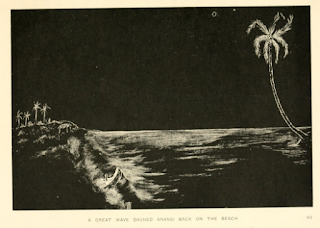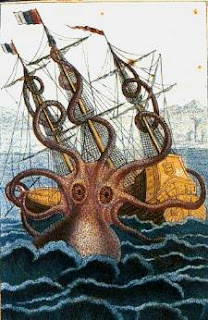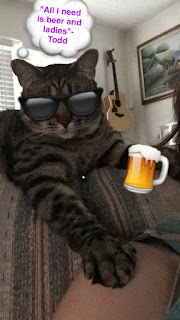Reading Notes: West African Folktales_Part A
For this week, I chose to do a reading from the African unit. The stories that I picked are from the West African Folktalkes by William H. Barker.
One of the main themes to these stories has to do with a recurring character. This character is Anansi, a spider, who is a trickster. The fact that there was a trickster is the main reason in deciding to pick these readings. Throughout these stories, the trickster, Anansi, is always up to some mischievous act(s), most of the time he is trying to configure how to twist the scenario into something that is beneficial to him.
The story that I found the most interesting was Anansi and Nothing. This story was similar to the Aesop fables because there was not necessarily a lesson at the end of the story, but there was an explanation for something that happens in reality. The explanation was, "...if you find a child crying and ask the cause, you will often be told he is 'crying for nothing'." (Barker) Anyways, in this story, Anansi and Nothing sort of swap roles (by swapping their clothes) and upon arriving at their destination, Anasi (who was wearing Nothing's 'rich' clothes) was perceived as the wealthy individual and Nothing (who was wearing Anansi's 'poor' clothes) was perceived as the lesser than Anansi because of the clothes that they had on their backs. This lead to them getting wives, one getting them and easier than the other; However, once they take their wives back to their home, it is revealed to the wives that the opposite is true, Anansi is the peasant and Nothing was the wealthy man. This leads to Anansi losing his wives, which causes him to become jealous of Nothing, and ends in Anansi trapping and killing Nothing.
I like these story because there are all of these events, manipulated by Anansi (the trickster), that lead up to his fall or the fall of others. I also like how Anansi is so selfish that he will essentially steal from his family (I am referring to the story Thunder and Anansi), but it is interesting to see that his family becomes aware of this, it is usually his son, Kweku Tsin. Then, Kweku Tsin figures out a plan to turn around the destruction that his father caused. I think it is a unique concept to have the son be the antithesis of his father, yet he stops his father by using Anansi's techniques, those of a trickster.
This is from the story, Thunder and Anansi
One of the main themes to these stories has to do with a recurring character. This character is Anansi, a spider, who is a trickster. The fact that there was a trickster is the main reason in deciding to pick these readings. Throughout these stories, the trickster, Anansi, is always up to some mischievous act(s), most of the time he is trying to configure how to twist the scenario into something that is beneficial to him.
The story that I found the most interesting was Anansi and Nothing. This story was similar to the Aesop fables because there was not necessarily a lesson at the end of the story, but there was an explanation for something that happens in reality. The explanation was, "...if you find a child crying and ask the cause, you will often be told he is 'crying for nothing'." (Barker) Anyways, in this story, Anansi and Nothing sort of swap roles (by swapping their clothes) and upon arriving at their destination, Anasi (who was wearing Nothing's 'rich' clothes) was perceived as the wealthy individual and Nothing (who was wearing Anansi's 'poor' clothes) was perceived as the lesser than Anansi because of the clothes that they had on their backs. This lead to them getting wives, one getting them and easier than the other; However, once they take their wives back to their home, it is revealed to the wives that the opposite is true, Anansi is the peasant and Nothing was the wealthy man. This leads to Anansi losing his wives, which causes him to become jealous of Nothing, and ends in Anansi trapping and killing Nothing.
I like these story because there are all of these events, manipulated by Anansi (the trickster), that lead up to his fall or the fall of others. I also like how Anansi is so selfish that he will essentially steal from his family (I am referring to the story Thunder and Anansi), but it is interesting to see that his family becomes aware of this, it is usually his son, Kweku Tsin. Then, Kweku Tsin figures out a plan to turn around the destruction that his father caused. I think it is a unique concept to have the son be the antithesis of his father, yet he stops his father by using Anansi's techniques, those of a trickster.




Comments
Post a Comment